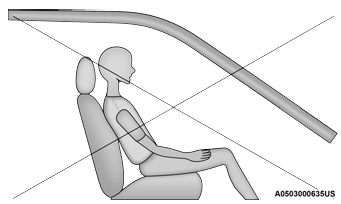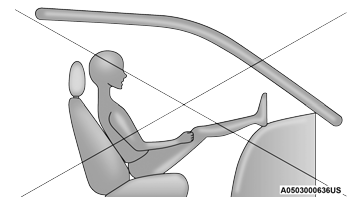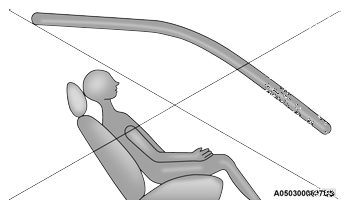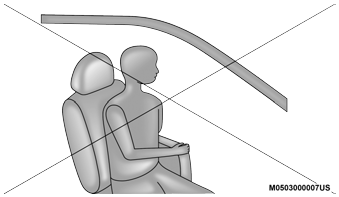Jeep Wrangler: Supplemental Restraint Systems (SRS) / Passenger Advanced Front Air Bag Disabled
(PAD) Indicator Light
 The Passenger Advanced Front Air
Bag Disabled
(PAD) Indicator Light (an amber light located on
the overhead sports bar) tells the driver and
front passenger when the Passenger Advanced
Front Air Bag is deactivated. The PAD Indicator
light illuminates the words “PASSENGER AIR
BAG OFF” to show that the Passenger Advanced
Front Air Bag will not deploy during a collision.
When the front passenger seat is empty or
when very light objects are placed on the seat
and the seat belt is unbuckled, the Passenger
Advanced Front Air Bag will not deploy even
though the PAD indicator light is NOT
illuminated.
The Passenger Advanced Front Air
Bag Disabled
(PAD) Indicator Light (an amber light located on
the overhead sports bar) tells the driver and
front passenger when the Passenger Advanced
Front Air Bag is deactivated. The PAD Indicator
light illuminates the words “PASSENGER AIR
BAG OFF” to show that the Passenger Advanced
Front Air Bag will not deploy during a collision.
When the front passenger seat is empty or
when very light objects are placed on the seat
and the seat belt is unbuckled, the Passenger
Advanced Front Air Bag will not deploy even
though the PAD indicator light is NOT
illuminated.
The PAD indicator light should not be illuminated when an adult passenger is properly seated in the front passenger seat. The driver and adult passenger should verify that the PAD Indicator Light is not illuminated when an adult is riding in the front passenger seat. If an adult is not seated properly, the Passenger Advanced Front Air Bag may deactivate and the PAD Indicator Light will be illuminated.
The PAD Indicator Light should be illuminated and the Passenger Advanced Front Air Bag should be deactivated for most properly seated and restrained children in the passenger seat and for most properly installed child restraint systems. However, under certain conditions, even with a properly installed child restraint system, the PAD Indicator Light may not be illuminated, even though the Passenger Advanced Front Air Bag is deactivated. This can occur if the child restraint is lighter than the lightest weight necessary to illuminate the PAD Indicator Light. NEVER assume the Passenger Advanced Front Air Bag is deactivated unless the PAD Indicator Light is illuminated with the words “PASSENGER AIR BAG OFF.”
NOTE:
If the seat belt is buckled for an empty seat, the PAD Indicator Light will illuminate.
If The PAD Indicator Light Is Illuminated For An Adult Passenger:
If an adult passenger is seated in the front passenger seat and the PAD Indicator Light is illuminated, the passenger may be sitting improperly. Follow the steps below to allow the OCS to detect the adult passenger’s seated weight to activate the Passenger Advanced Front Air Bag:
- Turn off the vehicle and have the adult passenger step out of the vehicle.
- Remove any extra materials from the passenger seat, such as cushions, pads, seat covers, seat massagers, blankets, extra clothing, etc.
- Place the seatback in the full upright position.
- Have the adult passenger sit in the center of the seat, with the passenger’s feet comfortably on or near the floor, and with their back against the seatback.
- Restart the vehicle and have the passenger remain in this seated position for two to three minutes after restarting the vehicle.
WARNING!
- If the PAD Indicator Light remains illuminated for an adult passenger, have an authorized dealer service the air bag system immediately. Failure to do so may cause serious injury or death. If the PAD Indicator Light is illuminated with the words "PASSENGER AIR BAG OFF," the Passenger Advanced Front Air Bag will not deploy in the event of a collision.
- Never place a rear-facing child restraint in front of an air bag. A deploying passenger front air bag can cause death or serious injury to a child 12 years or younger, including a child in a rear-facing child restraint.
- Never install a rear-facing child restraint in the front seat of a vehicle. Only use a rear-facing child restraint in the rear seat. If the vehicle does not have a rear seat, do not transport a rear-facing child restraint in that vehicle.
- Children 12 years or younger should always ride buckled up in the rear seat of a vehicle with a rear seat.
Lighter Weight Passengers (Including Small Adults)
When a lighter weight passenger, including a small adult, occupies the passenger seat, the Passenger Advanced Front Air Bag may be deactivated. Therefore, the Passenger Advanced Front Air Bag may or may not be activated for a lighter weight passenger, including a small adult (depending on size) who is seated in the passenger seat. This does not mean that the OCS is working improperly.
The driver and passenger must always use the PAD Indicator Light as a determination of whether the Passenger Advanced Front Air Bag is activated or deactivated. If the PAD Indicator Light is illuminated with the words “PASSENGER AIR BAG OFF” when an adult is in the front passenger seat, have the passenger reposition his or her body in the seat until the PAD Indicator Light goes out.
If the PAD Indicator Light is illuminated with the words “PASSENGER AIR BAG OFF” the Passenger Advanced Front Air Bag will not inflate in the event of a collision.
Do Not Decrease OR Increase The Front Passenger’s Seated Weight On The Front Passenger Seat
The front passenger’s seated weight must be properly positioned on the front passenger seat. Failure to do so may result in serious injury or death. The OCS determines the most probable classification of the occupant that it detects. The OCS will detect the front passenger’s decreased or increased seated weight, which may result in deactivation or activation of the Passenger Advanced Front Air Bag in a collision. This does not mean that the OCS is working improperly. Decreasing the front passenger’s seated weight on the front passenger seat may result in deactivation of the Passenger Advanced Front Air Bag causing serious injury or death. Increasing the front passenger’s seated weight on the front passenger seat may result in activation of the Passenger Advanced Front Air Bag. Examples of improper front passenger seating include:
- The front passenger’s weight is transferred to another part of the vehicle (like the door, arm rest or instrument panel).
- The front passenger leans forward, sideways, or turns to face the rear of the vehicle.
- The front passenger’s seatback is not in the full upright position.
- The front passenger carries or holds an object while seated (e.g., backpack, box, etc.).
- Objects are lodged under the front passenger seat.
- Objects are lodged between the front passenger seat and center console.
- Accessories that may change the seated weight on the front passenger seat are attached to the front passenger seat.
- Anything that may decrease or increase the front passenger’s seated weight.
The OCS determines the front passenger’s most probable classification. If an occupant in the front passenger seat is seated improperly, the occupant may provide an output signal to the OCS that is different from the occupant’s properly seated weight input, for example:

Not Seated Properly

Not Seated Properly

Not Seated Properly

Not Seated Properly
WARNING!
- If a child restraint system, child, small teenager or adult in the front passenger seat is seated improperly, the occupant may provide an output signal to the OCS that is different from the occupant’s properly seated weight input. This may result in serious injury or death in a collision.
- Always wear your seat belt and sit properly, with the seatback in an upright position, your back against the seatback, sitting upright, facing forward, in the center of the seat, with your feet comfortably on or near the floor.
- Do not carry or hold any objects (e.g., backpacks, boxes, etc.) while seated in the front passenger seat. Holding an object may provide an output signal to the OCS that is different than the occupant’s properly seated weight input, which may result in serious injury or death in a collision.
The Air Bag Warning Light  will
illuminate whenever the OCS is unable to classify the front passenger seat
status.
will
illuminate whenever the OCS is unable to classify the front passenger seat
status.
A malfunction in the OCS may affect the
operation of the air bag system. If the Air Bag
Warning Light  does not come on, or
stays on
after you start the vehicle, or it comes on as you
drive, take the vehicle to an authorized dealer
for service immediately.
does not come on, or
stays on
after you start the vehicle, or it comes on as you
drive, take the vehicle to an authorized dealer
for service immediately.
WARNING!
- Ignoring the Air Bag Warning Light in your instrument panel could mean you won’t have the air bags to protect you in a collision. If the light does not come on as a bulb check when the ignition is first turned on, stays on after you start the vehicle, or if it comes on as you drive, have an authorized dealer service the air bag system immediately.
- Placing an object on the floor under the front passenger seat may prevent the OCS from working properly, which may result in serious injury or death in a collision. Do not place any objects on the floor under the front passenger seat.
- If there is a fault present in the OCS, both the PAD Indicator Light and the Air Bag Warning Light will illuminate to show that the Passenger Advanced Front Air Bag is deactivated. Should this occur, the Passenger Advanced Front Air Bag will remain deactivated until the fault is cleared. This indicates that you should take the vehicle to an authorized dealer for service immediately.
The passenger seat assembly contains critical OCS components that may affect Passenger Advanced Front Air Bag inflation. In order for the OCS to properly classify the seated weight of a front seat passenger, the OCS components must function as designed. Do not make any modifications to the front passenger seat components, assembly, or to the seat cover. If the seat, trim cover, or cushion needs service for any reason, take the vehicle to an authorized dealer. Only FCA US LLC approved seat accessories may be used.
The following requirements must be strictly followed:
- Do not modify the front passenger seat assembly or components in any way.
- Do not use prior or future model year seat covers or cushions not designated by FCA US LLC for the specific model being repaired. Always use the correct seat cover and cushion specified for the vehicle.
- Do not replace the seat cover or cushion with an aftermarket seat cover or cushion.
- Do not add a secondary seat cover or mat.
- At no time should any Supplemental Restraint System (SRS) component or SRS related component or fastener be modified or replaced with any part except those which are approved by FCA US LLC.
WARNING!
- Unapproved modifications or service procedures to the passenger seat assembly, its related components, seat cover, or cushion may inadvertently change the air bag deployment in case of a frontal collision. This could result in death or serious injury to the front passenger if the vehicle is involved in a collision. A modified vehicle may not comply with required Federal Motor Vehicle Safety Standards (FMVSS) and/or Canadian Motor Vehicle Safety Standards (CMVSS).
- If it is necessary to modify the air bag system for persons with disabilities, contact an authorized dealer.
Knee Impact Bolsters
The Knee Impact Bolsters help protect the knees of the driver and front passenger, and position the front occupants for improved interaction with the front air bags.
WARNING!
- Do not drill, cut, or tamper with the knee impact bolsters in any way.
- Do not mount any accessories to the knee impact bolsters such as alarm lights, stereos, citizen band radios, etc.
 Occupant Classification Module (OCM) And Sensor
Occupant Classification Module (OCM) And Sensor
The Occupant Classification Module (OCM) is
located underneath the front passenger seat.
The Sensor is located beneath the passenger
seat cushion foam...
 Supplemental Side Air Bags
Supplemental Side Air Bags
Supplemental Seat-Mounted Side Air Bags (SABs)
This vehicle is equipped with Supplemental
Seat-Mounted Side Air Bags (SABs).
Supplemental Seat-Mounted Side Air Bags
(SABs) are located in the outboard side of the
front seats...
Other information:
Jeep Wrangler 2018-2025 Owners Manual: Anti-Lock Brake System (ABS)
The ABS provides increased vehicle stability and brake performance under most braking conditions. The system automatically prevents wheel lock, and enhances vehicle control during braking. The ABS performs a self-check cycle to ensure that the ABS is working properly each time the vehicle is started and driven...
Jeep Wrangler 2018-2025 Owners Manual: Carbon Monoxide Warnings
WARNING! Carbon monoxide (CO) in exhaust gases is deadly. Follow the precautions below to prevent carbon monoxide poisoning: Do not inhale exhaust gases. They contain carbon monoxide, a colorless and odorless gas, which can kill. Never run the engine in a closed area, such as a garage, and never sit in a parked vehicle with the engine running for an extended period...
